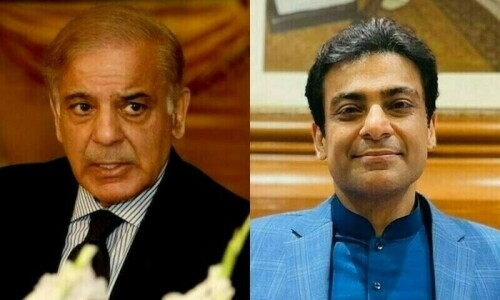ROOPA Farooki is a Lahore born novelist, who lives between France and Britain. Her books, including her first novel Bitter Sweet, shortlisted for the 2007 Orange Award for New Writers, loop together her European inheritance with Pakistan and Bangladesh, to which her father, N.A Farooki and mother, Niilofur Farooki, respectively belong. Her father, N.A. Farooki is remembered as a prominent figure in Pakistan’s literary circles in the 1960s, a writer of early Pakistani English fiction and founder of the Afro-Asian Book Club.
Last year Farooki published her third novel The Way Things Look To Me which was longlisted for the 2009 Orange Fiction Prize and now following it is another critically acclaimed novel Half Life. Both novels, reviewed here, portray complex emotions, relationships and family ties with great sensitivity.
The Way Things Look to Me is set in London, and centres round Yasmin Murphy, a bright 19-year-old with Asperger’s Syndrome. The focus of the narrative is the impact of a disadvantaged child on a family: the plot alternates between Yasmin and her older siblings, Asif and Kalila (Lila). Their mother has suddenly died, at the age of 40 from a weak heart while their father, a military man, died long ago while on a peacekeeping mission. As Asif and Lila try to cope with this loss, they are confronted by the implications of looking after Yasmin and catering to her special needs.
The 24-year-old Asif, a bright Cambridge graduate and an accountant decides to live with Yasmin to look after her, although this means sacrifices for him in both his career and his personal life. The beautiful Lila rebels, moves out and has a string of lovers, but also struggles with depression and eczema. Her encounter with Henry, a blind young man, acts as foil to her emotional instability: Lila finds herself with a man who cannot see her beauty but can see her inner emotional turmoil.
Both Asif and Lila suffer from low selfesteem, primarily because their mother had lavished extra attention on the disadvantaged Yasmin, leaving Lila and Asif with a sense of exclusion. Lila, in particular, has been very deeply wounded. She resents the special treatment Yasmin receives by all, and when a documentary is being made on her, Lila is troubled further as she herself never received such special attention or accolades. Lila’s anger is so deep-felt that she is half convinced there is nothing wrong with Yasmin.
Yasmin’s exceptional intelligence, which includes an ability to memorise facts and figures and work her way through complex problems logically is portrayed with great skill, as is her vulnerability and her inability to fully comprehend the world around her, or the emotions of others.
But in many ways, both Lila and Asif are ‘dysfunctional’ too and through such skilful depiction, the novel poses questions such as ‘What is normal?’, and ‘What is the norm?’
Farooki’s exploration of ‘normality’ and ‘difference’ is carried further, through the treatment of race. There is no mention of an Asian cultural identity as such, but small details such as the fact that Asif is often called As If — and his hatred for the appellation — is mentioned frequently.
When Asif is attracted to a part-Chinese, single mother, Mei Ling, at his office, it is only through his interaction with her that he understands how important it is for her to be called by her real name, rather than the shortened Anglicised ‘Lynn’ by which she is universally known by the staff and her English ex-husband.
Farooki continues to hone in on the multilayered intricacies of family relationships and friendships in her next novel Half Life which incorporates the wider South Asian diaspora as well as the relationship of East and West Pakistan. The main protagonist, Dr Aruna Ahmed Jones (Roony), a literature scholar of Singapore-Bangladeshi origin, has been studying the works of a respected but minor Bengali poet, Hari Hassan. She comes across a letter written by him during 1971 to his old friend Anwar, a Punjabi military officer, who had been at Oxford and later in the British Indian army with him. He writes,
‘My brother enemy. There will always be a place for you in my heart, but there is no longer a place for you in my country. The green and pleasant land is red with the blood of brave men, broken women and innocent children, and the calls for vengeance will not and should not be silenced. My brother, my enemy, it is time to stop fighting and go home.’ For Roony, the last sentence appears to echo in her personal life. She becomes aware of the different resonances of the entire paragraph, as family secrets unfold and she comes to realise that bloodlines can be deceptive and that every action must lead to a reckoning.
She decides to walk out on her discontented life in England and on her husband, Patrick, a doctor who she married rather impetuously. She returns home to Singapore, and gets in touch with Ejaz Ahsan (Jazz) who she grew up with. Roony suffers from a bipolar disorder and believing that she is cured, discontinues her medicines. As the novel weaves between the past and present, it contrasts her life in England and Singapore and also reveals how little she revealed about herself to Patrick, especially her inability to bear children. The narrative moves between Roony and Jazz and the poet Hari Hassan, who is dying in a hospital in Kuala Lumpur and it is revealed is Jazz’s estranged father.
The manner in which Farooki treats the 1971 war, as well as Hari’s relationship with Anwer and the quiet intertwining of their personal and family histories (as well as that of the two nations) all reflect upon Farooki’s subtle use of suggestion and innuendo to convey volumes. Through the stories of Roony, Jazz and Hari Hassan, Farooki gathers up the story of the two families, weaving the subcontinent and its divisions across two generations as backdrop for the novel.
While Jazz tries to cope with Roony’s sudden arrival in Singapore and her refusal to settle back into their old life, he is also haunted by other ghosts, including his fractured relationship with his father, a man he greatly resents. Jazz’s difficulties are accentuated by the knowledge that his mother was suffering from cancer and died in a fire, under suspicious circumstances. Ultimately, as their stories unravel, both Jazz and Roony learn to face home truths and Roony is able to help Hari Hassan and Jazz reach out to each other.
Roopa Farooki has created full-blooded characters and provided thought-provoking insight into their lives and all this makes her an accomplished storyteller.
The Way Things Look to Me (NOVEL) By Roopa Farooki Pan, London ISBN 978-0-330-46315-7 350pp. £7.99 Half Life (NOVEL) By Roopa Farooki Macmillan, London ISBN 978-0-312-57790-7 260pp. £11.99














































Dear visitor, the comments section is undergoing an overhaul and will return soon.